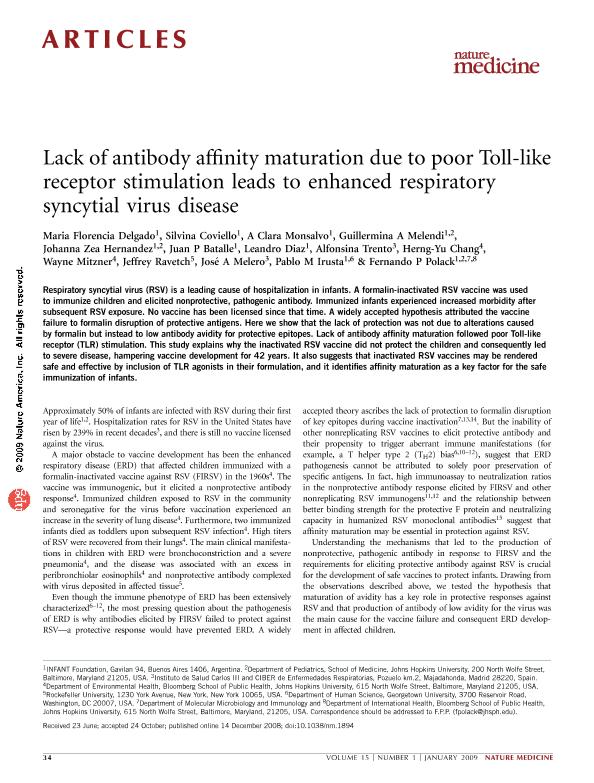Artículo
Lack of antibody affinity maturation due to poor Toll-like receptor stimulation leads to enhanced respiratory syncytial virus disease
Delgado, Maria Florencia ; Coviello, Silvina Andrea
; Coviello, Silvina Andrea ; Monsalvo, Ana Clara
; Monsalvo, Ana Clara ; Melendi, Guillermina Amanda; Hernandez, Johanna Zea; Batalle, Juan Pio
; Melendi, Guillermina Amanda; Hernandez, Johanna Zea; Batalle, Juan Pio ; Diaz, Leandro; Trento, Alfonsina; Chang, Herng-Yu; Mitzner, Wayne; Ravetch, Jeffrey; Melero, José A.; Irusta, Pablo M.; Polack, Fernando Pedro
; Diaz, Leandro; Trento, Alfonsina; Chang, Herng-Yu; Mitzner, Wayne; Ravetch, Jeffrey; Melero, José A.; Irusta, Pablo M.; Polack, Fernando Pedro
 ; Coviello, Silvina Andrea
; Coviello, Silvina Andrea ; Monsalvo, Ana Clara
; Monsalvo, Ana Clara ; Melendi, Guillermina Amanda; Hernandez, Johanna Zea; Batalle, Juan Pio
; Melendi, Guillermina Amanda; Hernandez, Johanna Zea; Batalle, Juan Pio ; Diaz, Leandro; Trento, Alfonsina; Chang, Herng-Yu; Mitzner, Wayne; Ravetch, Jeffrey; Melero, José A.; Irusta, Pablo M.; Polack, Fernando Pedro
; Diaz, Leandro; Trento, Alfonsina; Chang, Herng-Yu; Mitzner, Wayne; Ravetch, Jeffrey; Melero, José A.; Irusta, Pablo M.; Polack, Fernando Pedro
Fecha de publicación:
01/2009
Editorial:
Nature Publishing Group
Revista:
Nature Medicine
ISSN:
1078-8956
Idioma:
Inglés
Tipo de recurso:
Artículo publicado
Clasificación temática:
Resumen
Respiratory syncytial virus (RSV) is a leading cause of hospitalization in infants. A formalin-inactivated RSV vaccine was used to immunize children and elicited nonprotective, pathogenic antibody. Immunized infants experienced increased morbidity after subsequent RSV exposure. No vaccine has been licensed since that time. A widely accepted hypothesis attributed the vaccine failure to formalin disruption of protective antigens. Here we show that the lack of protection was not due to alterations caused by formalin but instead to low antibody avidity for protective epitopes. Lack of antibody affinity maturation followed poor Toll-like receptor (TLR) stimulation. This study explains why the inactivated RSV vaccine did not protect the children and consequently led to severe disease, hampering vaccine development for 42 years. It also suggests that inactivated RSV vaccines may be rendered safe and effective by inclusion of TLR agonists in their formulation, and it identifies affinity maturation as a key factor for the safe immunization of infants.
Palabras clave:
RSV
,
FIRSV
,
TLR
,
Antibodies
Archivos asociados
Licencia
Identificadores
Colecciones
Articulos(SEDE CENTRAL)
Articulos de SEDE CENTRAL
Articulos de SEDE CENTRAL
Citación
Delgado, Maria Florencia; Coviello, Silvina Andrea; Monsalvo, Ana Clara; Melendi, Guillermina Amanda; Hernandez, Johanna Zea; et al.; Lack of antibody affinity maturation due to poor Toll-like receptor stimulation leads to enhanced respiratory syncytial virus disease; Nature Publishing Group; Nature Medicine; 15; 1; 1-2009; 34-41
Compartir
Altmétricas



